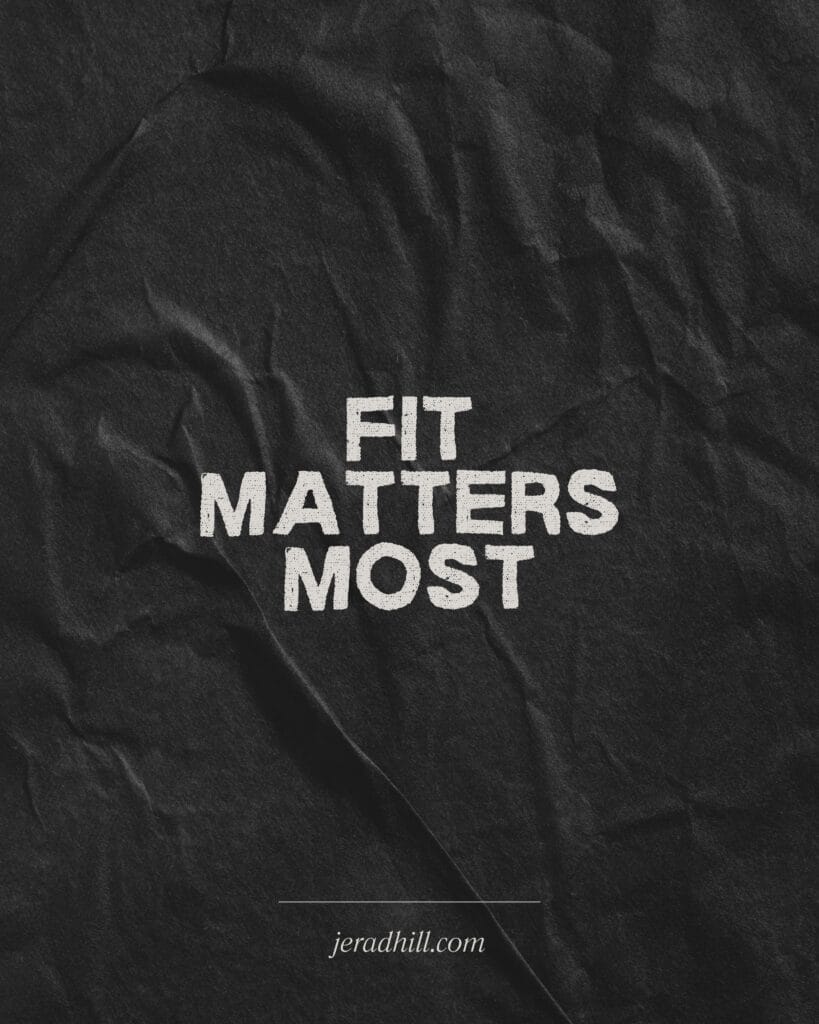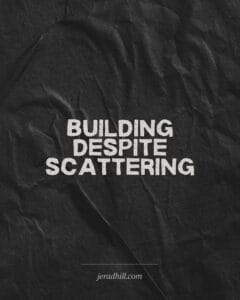What I’m learning about being wired for depth in a world designed for maintenance
I’ve spent the last few weeks in some of the most clarifying conversations of my life. Not the comfortable kind, the kind that make you look in the mirror and ask hard questions about why certain patterns keep showing up.
Here’s what I’ve been wrestling with: Why do I keep ending up on the outside of things I care deeply about?
It’s happened enough times now that I can’t dismiss it as bad luck or difficult people. College. My previous church. Multiple committees. Leadership roles. The pattern is consistent enough that I have to own it.
But here’s what I’m learning: The pattern isn’t what I thought it was.
The Story I’ve Been Telling Myself
For years, I’ve wondered if something is fundamentally wrong with me.
Everyone else seems to “flow” in relationships and organizations. They show up, do their thing, get along, and move forward. Meanwhile, I’m the guy noticing that the committee isn’t accomplishing much, that the communication strategy isn’t working, that what we say we value and what we actually do don’t match up.
And then I’m the guy who, after trying to help, after proposing solutions, after investing time and energy, eventually steps back because I’ve hit a wall I don’t know how to get through.
From the outside, it probably looks like I can’t commit. Like I get frustrated and bail. Like I’m the problem.
I’ve wondered if that story is true.
What I’m Actually Discovering
Through these recent conversations, something clicked into place, not about them being wrong, but about fit and wiring.
When I encounter organizational dysfunction, committees that spin wheels, leaders who solicit input but never use it, systems that say one thing but do another, I respond in a specific way:
I see it. I feel compelled to address it. I struggle to move forward without addressing it.
Others respond differently, and their responses are just as valid:
- Some genuinely don’t notice the dysfunction (different wiring, not different intelligence)
- Some notice but have learned healthy detachment (wisdom I often lack)
- Some see it but wisely choose their battles (discernment I’m still developing)
- Some are content with incremental change (patience I need to learn)
None of these responses are wrong. They’re just different from mine.
But my wiring, to see systems, recognize patterns, and feel urgency about making things better, creates a specific kind of friction. Not because I’m better, but because I’m often mismatched to the context I’m in.
The Cost of the Mismatch
One of my mentors recently told me about a time he supervised highly gifted people in complex environments. These people had sharp analytical skills and deep motivation, exactly what the mission needed.
But their local supervisors often experienced them as problems to be managed rather than assets to be deployed.
Not because anyone was bad at their job. But because the supervisors’ strengths were in stability and maintenance, while these team members’ strengths were in innovation and problem-solving.
Both were needed. Both were valuable. But when the organizational moment called for one and someone brought the other, friction was inevitable.
He said something that’s been echoing in my head: “The strengths that they had were not seen as strengths, they were seen as a problem either to be boxed or somehow managed.”
I’ve been that person. Over and over.
Not because the leaders I’ve worked with were bad leaders. Many of them were deeply faithful, caring people doing their best in difficult circumstances.
But because my particular wiring often shows up at the wrong organizational moment, or in contexts structured for different strengths than mine.
What I’m Learning to Accept
Here’s what’s becoming clear through all of this:
1. Mismatch Isn’t Moral Failure
For years, I’ve interpreted these experiences as evidence that something is wrong with me; that I’m too critical, too intense, too unable to just be content.
But fit matters more than I realized.
Some people thrive in structured hierarchies. I don’t, and that’s okay.
Some people are energized by maintaining what works. I’m wired to see what could work better.
Some people process by going along and adjusting slowly. I process by questioning and understanding first.
None of these are superior. They’re just different.
And when my wiring meets a context that needs something else, friction happens; not because anyone is wrong, but because we’re asking each other to be something we’re not.
2. I Contribute to the Problem
I’m learning that my way of showing up creates its own challenges:
I overgeneralize. When I see a pattern, I describe it too broadly. Even though I do it to avoid pointing fingers directly, it still makes people feel unfairly characterized.
I accumulate observations. Instead of addressing small things early, I gather evidence until I present “a mountain” all at once, which overwhelms people and feels like an ambush.
I lead with problems. My first instinct is to identify what’s broken, not celebrate what’s working. That’s exhausting to be around.
I assume others see what I see. When they don’t, I can come across as threatening rather than genuinely curious about their perspective.
I want depth and reciprocity in relationships. I’m learning that my timeline for when that should develop doesn’t match most people’s bandwidth or wiring. I also tend to wait too long to address relational issues directly, accumulating frustration instead of speaking up early when things feel one-sided. Then when I finally do speak, it comes out as ‘a mountain of evidence’ that overwhelms people.
These aren’t excuses. They’re real issues I’m working on. I make relationships harder than they need to be.
3. “Going With the Flow” Might Be Wisdom
When someone tells me I need to “just flow” with things, I’ve been interpreting that as “accept dysfunction.”
But maybe it’s actually: “Choose your battles. Not everything needs to be fixed right now. Sometimes presence matters more than progress.”
That’s not settling. That’s wisdom in certain circumstances.
I’m learning there’s something beautiful about people who can show up consistently, serve faithfully in small ways, and be content without needing to change everything. That’s a kind of faithfulness I often miss while I’m busy analyzing systems.
4. I’m Asking a Lot
When I offer:
- Deep vulnerability
- Direct feedback
- Intellectual engagement
- Problem-solving partnership
I’m asking for the same in return.
But that’s a lot to ask. Most people:
- Aren’t practiced at that level of vulnerability
- Haven’t been invited into collaborative problem-solving
- Don’t process through direct confrontation of issues
- Are doing the best they can with limited bandwidth
I need to honor that rather than feeling cheated when people can’t meet me there.
What I’m Changing
So what do I do with all of this?
Own My Part First
Before I assess organizational fit, I need to get better at:
- Addressing things early instead of accumulating
- Using “I” statements about my experience rather than generalizations
- Celebrating what’s working before diving into problems
- Staying curious about other perspectives longer
- Matching my intensity to the relationship’s capacity
I can’t control contexts, but I can control how I show up in them.
Get More Discerning About Fit
Not every mismatch means someone is wrong. Sometimes it just means this isn’t the right organizational moment for my particular wiring.
I need to recognize faster when:
- A context genuinely needs what I bring (stay and contribute)
- A context needs something different right now (serve in other ways)
- My presence is creating more friction than value (gracefully step back)
This isn’t quitting. It’s stewardship of my gifts and respect for others’ leadership.
Extend More Grace
Leaders working with limited resources, inherited problems, and competing demands are doing hard work.
Just because I see a solution doesn’t mean:
- They don’t see it too
- It’s the right time to implement it
- They have the bandwidth for it
- My solution is the best one
I need to trust that they’re weighing factors I might not see, even as I offer observations they might not have considered.
Find Complementary Partnerships
Instead of expecting everyone to work the way I do, I need to find contexts where:
- My systems-thinking complements others’ purpose
- My urgency balances others’ patience
- My innovation works alongside others’ stability
- My questions strengthen others’ convictions
Not everyone needs to be like me. But I do need to find people who value what I bring.
The Freedom in Knowing
Here’s what’s wild about all of this:
I spent years thinking something was wrong with me.
Wondering why I couldn’t just be content like others. Why I couldn’t just show up, do my part, and not worry about systems and patterns.
Through these conversations, I’m realizing: I’m not defective. But I am rare.
My wiring is real. My contributions have value. But they have limits and costs that I haven’t fully owned.
I make things harder sometimes. Not on purpose, but because intensity is hard to be around. Because constant problem-identification is exhausting. Because my pace isn’t everyone’s pace.
And that’s okay to name.
What I’m Taking Forward
I don’t know exactly what comes next. I’m in the middle of some situations right now where these realizations are forcing decisions.
But here’s what I know:
I’m not going to keep forcing fit where it doesn’t exist.
I’m not going to label myself as “difficult” just because I notice what others overlook.
Not because those contexts are wrong. But because mismatch serves no one.
I’m going to own my part, the ways I create friction, the growth I genuinely need, the grace I haven’t always led with.
And I’m going to get more discerning about where I invest deeply versus where I serve faithfully from the margins.
Some contexts need what I bring. Others need something different. And that’s okay.
If You’re Reading This and Nodding
Maybe you’re like me.
Maybe you’ve been called “too much” or “too intense” or “can’t just let things go.”
Maybe you’ve wondered why you keep ending up on the outside of things you care about.
Maybe you’ve questioned whether something is fundamentally wrong with you.
Let me tell you what I’m learning:
You’re not broken. You’re rare.
Your combination of seeing clearly, caring deeply, and wanting to make things better, that’s not a flaw. That’s a gift.
But it means most places won’t fit unless you first develop your gift.
And that’s okay.
Stop blaming yourself. Be willing to adapt and find contexts worthy of your gifts.
The world needs people who see what’s broken and believe it can be better.
That’s not failure. That’s wisdom.
What about you? Have you experienced this tension between your wiring and your context? How have you navigated it? I’d love to hear your story in the comments.




